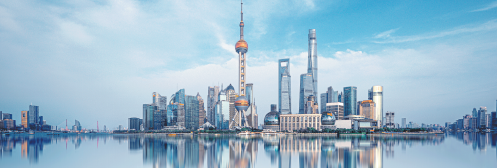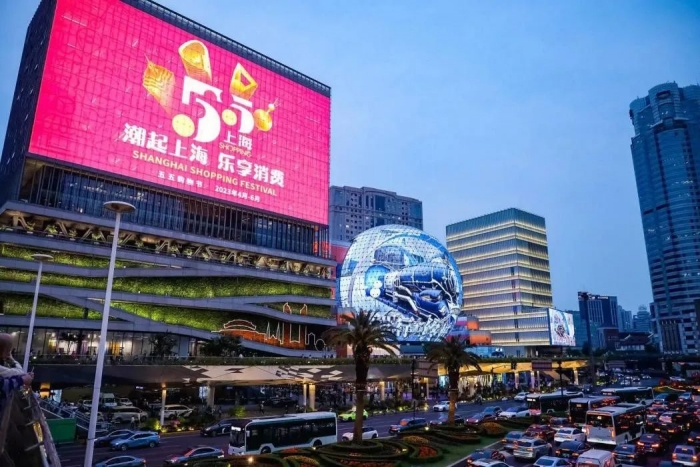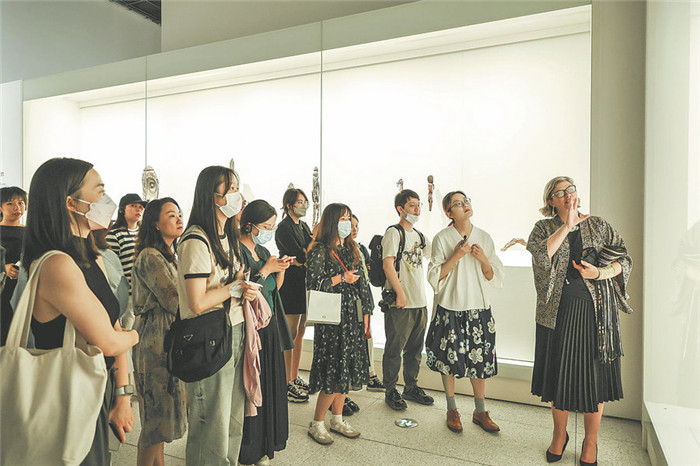Pioneering policies of FTZ hailed for economic growth
Hamilton Lane and Tesla among foreign firms to invest and succeed in Chinese market
The China (Shanghai) Pilot Free Trade Zone has made substantial achievements over the past decade, according to a recent white paper.
The white paper was released on Sept 20 at a forum commemorating the 10th anniversary of the Shanghai FTZ's establishment. The inaugural FTZ in China was founded in Pudong New Area.
With an area just one-8,000th of the country's total, the Shanghai FTZ generated a GDP that accounts for one-74th of the country's total, the white paper found.
Also according to the paper, 84,000 new enterprises were registered with the zone by the end of 2022, more than twice the number of enterprises established in the 20 years before the zone's establishment.
Benefiting from the FTZ's development, Pudong New Area attracted 18,691 foreign-funded investment projects by 2022, with cumulative registered capital of $217.27 billion and cumulative paid-in foreign investment of $74.99 billion, noted the paper.
Continued momentum
The growth momentum has continued into this year. In February, Hamilton Lane, an alternative investment management firm headquartered in the United States opened its Shanghai office in the zone. It marks the firm's first location on the Chinese mainland and its sixth in the Asia-Pacific region, after those in Hong Kong, Seoul, Singapore, Sydney and Tokyo.
Hamilton Lane was granted a Qualified Foreign Limited Partner pilot status in 2022 in Shanghai, which is a financial hub in China. QFLP is a structure that allows foreign investors to convert dollars to renminbi and make investments in RMB-denominated private equity and venture capital markets.
With this approval, Hamilton Lane has become the first institution in Shanghai to establish a secondary fund through a QFLP structure. It has begun sourcing investment opportunities in the RMB market.
This is an open system in China that welcomes foreign investment institutions to invest in the RMB market, said Xia Mingchen, head of the Shanghai Office of Hamilton Lane.
In addition to Shanghai, many other Chinese cities have such a system. However, as a national private equity fund hub, the Shanghai FTZ attracts a host of asset management institutions from around the world and enjoys significant institutional convenience, Xia noted. He added that choosing the Shanghai FTZ as the location of the office was the result of much consideration.
"We have observed growing demand from domestic institutional and private wealth investors to allocate their capital to global assets, and we are thrilled to have an established presence on the ground in Shanghai from which to manage private markets investment programs for investors of all sizes," he said.
"At Hamilton Lane, we have been investing in the region for more than 15 years and with our new capabilities in the RMB market, we'll be even better positioned to deliver new and differentiated private markets solutions to our clients."
'Tesla speed'
US-headquartered new energy vehicle manufacturer Tesla, the first wholly foreign-owned automaker in China, is among the beneficiaries of innovative policies in the Shanghai FTZ.
Located in the Lingang New Area of the FTZ, Tesla Giga Shanghai, the first such production facility outside the company's home turf, covers an area of 865,000 square meters and cost 50 billion yuan ($6.84 billion) to build.
Since Tesla signed a strategic agreement with the Shanghai government in July 2018, it took just 18 months to complete the gigafactory and get it running, creating a record "Tesla speed" for an investment project.
The first batch of China-made Tesla Model 3 vehicles were delivered to customers in the Giga Shanghai at the end of 2019.
At the ceremony, Elon Musk, Tesla CEO and co-founder, sent the Shanghai government a letter of thanks. It said that the company would have been unable to complete such a wonder without the support from the Chinese government, especially the Shanghai government. It is through joint efforts that created the amazing "Shanghai speed" and a record in the global auto manufacturing industry, Musk said.
Since then, Tesla has been at full steam ahead, ramping up investments in the Shanghai FTZ. With these investments, Tesla has expanded the production capacity of Giga Shanghai and added a manufacturing facility to make electric vehicle chargers.
After four years of operating in the Shanghai FTZ, Tesla's development resilience and pace in China have impressed its global vice-president Tao Lin.
It is easy to sprint at the starting line but it is difficult to maintain this speed every day. It is a big challenge and a real test of the development mettle of enterprises or regions to maintain sprinting speed in the long run, she said.
Giga Shanghai produced its one-millionth vehicle in August 2022 and completed its 2 millionth vehicle 13 months later in early September. Just a few days later, the 5 millionth Tesla vehicle worldwide rolled off the production line at Giga Shanghai.
The company announced in April to up the ante, increasing its investment in Shanghai to build a Megapack battery plant.
In the initial stage, the annual output of the extra-large commercial-use energy storage batteries is planned to reach 10,000 units, with a combined storage capacity of nearly 40 gigawatt-hours.
Tao said her team is proud of having maintained development at such a pace over the past four years. Tesla has kept on expanding investment and adding production lines in Shanghai because the company has faith in the city's business environment, she noted.
In the next decade, the company will continue the pace and wishes to gain greater momentum and attract more businesses and people to join it in the development of the Shanghai FTZ, she said.
Tesla's success can't be separated from the FTZ's optimized business environment and institutional innovation, Tao said.
The institutional advantages can not only help a business quickly come into being but enable it to stay vigorous throughout its operations, she noted.
Drawn by Tesla, more than 360 upstream and downstream businesses along the industry chain have settled in the Lingang New Area and surrounding areas, enjoying the benefits of innovation and efficiency of the FTZ.
Growing recognition
The Shanghai FTZ has created a more favorable institutional environment for businesses over the past decade, leading to a higher sense of achievement and satisfaction among enterprises, said the white paper.
A survey conducted by a third-party institution shows more than 80 percent of the businesses in the FTZ agreed on a marked or considerable improvement in the zone's business environment; easy access to policies, measures and other information; and better transparency in law enforcement and administrative policies.
The majority of the business respondents recognized the coordination among various reform and innovative measures and had high expectations for the zone's reform and innovation, the survey found.
"On the whole, the construction of the Shanghai FTZ has effectively stimulated market vitality and demonstrated its leading role (in the local economy), with across-the-board upgrades to regional development and a significantly enhanced ability to serve national strategies," Zhu Zhisong, head of Shanghai FTZ's administrative committee, said at a news conference on Sept 15.
Government data show that the zone attracted $58.6 billion in paid-in foreign capital by the end of 2022 — approximately 30 percent of Shanghai's total.
Driven by the FTZ, the Pudong New Area generated more than 1.6 trillion yuan in GDP in 2022, 2.5 times that in 2013.
Currently, Pudong is home to the regional headquarters of 432 multinationals and more than 250 foreign-funded research and development centers. Both account for nearly half the city's total.
The past decade witnessed a package of pioneering policies, a series of breakthrough practices and a large number of landmark achievements, said Zhu, who also serves as the Party secretary of the Pudong New Area.
"Among the 302 institutional innovation achievements of the pilot free trade zones that have been promoted at a national level, nearly half either originated from Shanghai or are concurrent with its pioneering practices, fully demonstrating the Shanghai FTZ's role as a testing ground in deepening comprehensive reform and expanding opening-up," he said.

The China (Shanghai) Pilot Free Trade Zone in Pudong New Area has attracted a host of foreign businesses over the past decade. CHINA DAILY
 Contact Us
Contact Us

 New pedestrian street boosts Pudong's night economy
New pedestrian street boosts Pudong's night economy  Festival injects vitality into Shanghai's consumer market
Festival injects vitality into Shanghai's consumer market A journey through history
A journey through history Chinese roses bloom in Pudong
Chinese roses bloom in Pudong


